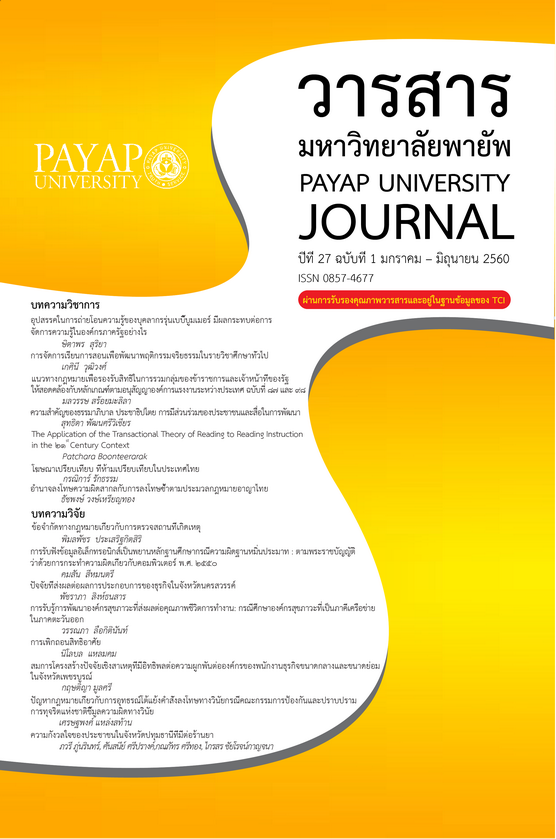การรับฟ้งข้อมูลอิเล็กทรอนิกส์เป็นพยานหลักฐานศึกษากรณีความผิดฐานหมิ่นประมาท: ตามพระราชบัญญัติว่าด้วยการกระทำความผิดเกี่ยวกับ คอมพิวเตอร์ พ.ศ. 2550
Main Article Content
บทคัดย่อ
การศึกษาวิจัยนี้มีวัตถุประสงค์เพื่อให้ทราบถึง หลักเกณฑ์ กระบวนการ แนวความคิด ตลอดจนทฤษฏีในการรับฟังข้อมูลอิเล็กทรอนิกส์ในคดีความผิดในฐานหมิ่นประมาทตามพระราชบัญญัติว่าด้วยการกระทำความผิดเกี่ยวกับคอมพิวเตอร์ พ.ศ. 2550 รวมทั้งแนวทางในการดำเนินคดีที่เกี่ยวข้องกับข้องกับความผิดเกี่ยวกับคอมพิวเตอร์ในชั้นศาลของไทยและเปรียบเทียบแนวทางปฏิบัติในเรื่องเกี่ยวกับการใช้ข้อมูล อิเล็กทรอนิกส์เป็นพยานหลักฐานในคดีเกี่ยวกับความผิดหมิ่นประมาทกับต่างประเทศ
สำหรับในเรื่องของการรับฟังข้อมูลอิเล็กทรอนิกส์เป็นพยานหลักฐานในคดีเกี่ยวกับความผิดหมิ่น ประมาทตามประมวลกฎหมายอาญา การศึกษาพบว่ายังเกิดประเด็นปัญหาในเรื่องของการรับฟังข้อมูล อิเล็กทรอนิกส์เป็นพยานหลักฐาน ดังนี้
- ปัญหาการรับฟังข้อมูลอิเล็กทรอนิกส์เป็นพยานหลักฐานในการพิจารณาคดี
- ปัญหาการพิสูจน์ความถูกต้องแท้จริงของข้อมูลอิเล็กทรอนิกส์ผู้ให้บริการข้อมูลอิเล็กทรอนิกส์
- ปัญหาการชั่งนี้าหนักพยานหลักฐานอิเล็กทรอนิกส์
จากการศึกษา ผู้ศึกษาเห็นว่า ควรมีการแกไขและปรับปรุงกฎหมายที่เกี่ยวข้องในเรื่องของการรับข้อมูลอิเล็กทรอนิกส์เป็นพยานหลักฐานในคดีหมิ่นประมาท ดังนี้
- ควรกำหนดแนวทาง หลักเกณฑ์ที่ซัดเจนในการรับรองความถูกต้องแท้จริงของพยาน อิเล็กทรอนิกส์ โดยผู้ที่เกี่ยวข้องในขั้นตอนต่างของพยานหลักฐานจะต้องรับรองความมีอยู่, ความถูกต้อง, การเข้าถึงและการได้มาของข้อมูลอิเล็กทรอนิกส์
- การนำสืบพยานหลักฐานอิเล็กทรอนิกส์ในชั้นศาล เห็นควร กำหนดประเภทของพยานหลักฐาน อิเล็กทรอนิกส์ให้สอดคล้องกับประเภทของพยานหลักฐานตามกฎหมายไทย เพื่อให้เกิดความชัดเจนและเป็น มาตรฐานเดียวกันในการพิจารณา
- ควรกำหนดให้มีแผนกที่เกี่ยวข้องในส่วนของระบบคอมพิวเตอร์และระบบอิเล็กทรอนิกส์ และ เพิ่มผู้พิพากษาที่มีความรู้ในเชิงลึกในเรื่องระบบคอมพิวเตอร์และระบบอิเล็กทรอนิกส์
Article Details
เอกสารอ้างอิง
จอน อึ๊งภากรณ์ และคณะ. (2552). ไมตรี: เผยแพร่คลิปหมิ่นประมาททหาร, สืบค้นเมื่อวันที่ 12 มิถุนายน 2559. https://freedom.ilaw.or.th/case/669#progress_of_case.
จรัญ ภักดีธนากุล. (2551). กฎหมายลักษณะพยานหลักฐาน. หจก.จิรรัชการพิมพ์. กรุงเทพฯ.
นัทธ์ ธเนศวาณิชย์. (2555). การรับฟังและวิรีการนำสืบพยานหลักฐานอิเล็กทรอนิกส์ในคดีอาญา: ศึกษาตาม พระราชบัญญัติว่าด้วยการกระทำความผิดเกี่ยวกับคอมพิวเตอร์ พ.ศ. 2550. วิทยานิพนธ์นิติศาสตรมหาบัณฑิต มหาวิทยาลัยธรรมศาสตร์
โสภณ รัตนากร. (2539). คำบรรยายกฎหมายลักษณะพยาน. สำนักพิมพ์นิติบรรณาการ. กรุงเทพฯ.
เสาวภางค์ ปิยะรัตน์. (2542). การนำสารสนเทศมาใช้เป็นพยานหลักฐานในคดีแพ่ง. วิทยานิพนธ์มหาบัณฑิต มหาวิทยาลัยธรรมศาสตร์.
National conference of commissioners on uniform state laws. (1999). Uniform Computer Information Transactions Act 1999. สืบค้นเมือวันที 2 มิถุนายน 2559, https://www.uniformlaws.org/sharecl/clocs/computer_information_transactions/citaam99.pdf.
The Legal Information Institute (Lll). (1992). Federal Rules of Evidence. สืบค้นเมือวันที 20 มิถุนายน 2559, https://www.law.cornell.edu/rules/fre.
The National Archives. (1998). Civil Evidence Act 1995. สืบค้นเมือวันที 12 มิถุนายน 2559, https://www.legislation.gov.uk/ukpga/1995/38/section/1ElectronicCommunicationsAct 2000.


